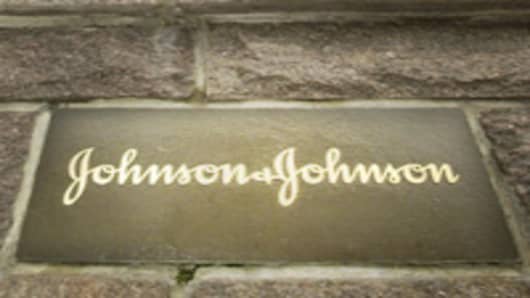Johnson & Johnson said Tuesday its fourth-quarter earnings rose almost 10 percent, beating forecasts, as the weak dollar propelled overseas sales of its drugs, medical devices and consumer products.
The diversified health-care company earned $2.37 billion, or 82 cents per share, compared with $2.17 billion, or 74 cents per share, in the year-earlier period.
Excluding special items, J&J earned 88 cents per share.
Analysts polled by Reuters Estimates, on average, had expected 86 cents per share. The items included a charge of $441 million related to its poorly selling heart-failure drug Natrecor and a $267 million tax gain.
The company's global sales jumped almost 17 percent to $15.96 billion, well ahead of the Reuters Estimates forecast of $15.37 billion. Growth would have been 4.7 percentage points less if not for the weak dollar, which boosted overseas sales.
Overseas sales surged 26 percent, with favorable foreign exchange factors accounting for 10.5 percentage points of that growth.
Quarterly global sales of prescription drugs rose 7.5 percent to $6.4 billion. Anti-psychotic medicines, including schizophrenia treatment Risperdal, rose 15 percent to $1.22 billion, despite strong competition from rival products such as Bristol-Myers Squibb's Abilify schizophrenia drug.
Concerta, for attention deficit disorder, rose 12.5 percent to $289 million, while sales of injectable arthritis treatment Remicade jumped 16 percent to $908 million. Epilepsy drug Topamax grew 23 percent to $652 million, helped by increasing use of the medicine to also treat migraine headaches.
But sales of anemia medicines Eprex and Procrit continued to suffer from safety concerns, falling 20 percent to $628 million.
Medical device sales in the fourth quarter jumped 11.3 percent to $5.75 billion, helped by higher sales of the company's DePuy orthopedic products and J&J's diagnostics and vision care brands.
But global sales of J&J's Cypher stent, used to prop open arteries that have been cleared of plaque, plunged 31 percent to $415 million as rival products wrested away market share and doctors continued to perform fewer stent procedures due to concerns such devices can increase risk of dangerous blood clots.
Revenue from consumer products jumped almost 49 percent in the quarter to $3.81 billion, largely due to an array of products recently acquired from Pfizer , including Listerine mouthwash.


